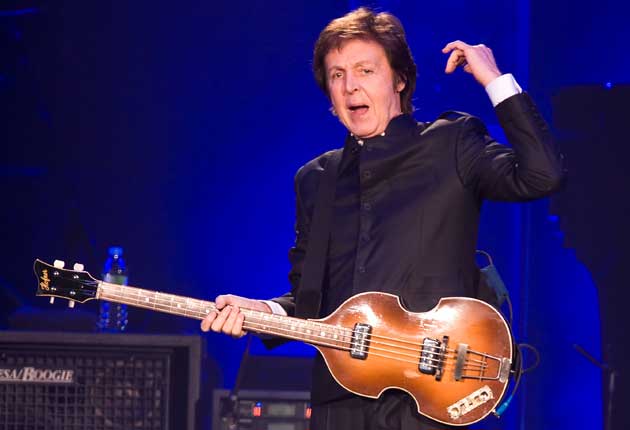Paul McCartney, O2 Centre, London

It's a pity that Paul McCartney's brief set on the final of The X Factor would have been the first sight of him in concert for many. Out of sorts, with his voice in poor shape and his normally personality awol, he cut a puzzling figure. A couple of weeks later in a one-off London gig, he served up a tremendous, high-energy show, disspelling any fears that at 67 he might have lost his touch.
At first I did have doubts. The opening volley of numbers, "Magical Mystery Tour", "Drive My Car", "Jet", were delivered in McCartney's "let's rock'n'roll" style, his band too often lacking the subtlety, the light and shade, even the frailty that marks out his best songs. It was in-your-face bombast, even for a song like "The Long and Winding Road", a treatment that ironically so appalled him when Phil Spector messed with it on record years ago.
But then utterly unpredictably the show turned on a beautiful version of George Harrison's "Something" in a tribute to his former bandmate. It was that new-found willingness to sing songs not associated with him that was the fascination of the evening. The bombast banished, he relished performing "A Day in the Life", curiously stumbling over the few lines that he had written rather than Lennon's verses. That segued into "Give Peace a Chance". Even the encore, "Day Tripper", was more Lennon than McCartney in its composition, but how he loved singing it again.
It was the confidence to mention the once unmentionable that must have led him to perform for the first time in England "Ob-La-Di, Ob-La-Da", the song Lennon famously despised. And what a revelation it was. Many found it embarrassing on disc, but boy does it work live. People of all ages, and there really were all ages at this concert, were up and dancing.
It was good to be reminded too with "Let Me Roll It", and a riff that refuses to leave your mind, that the much maligned Wings did come up with some classics. But it was inevitably his first group's songs that brought the involuntary gasps. When he performed a beautifully tender "And I Love Her", a song he wrote for Jane Asher (and how that sort of pop trivia sounds faintly absurd now) followed by "Eleanor Rigby", "Back in the USSR" and "Paperback Writer", another song that hadn't been in his repertoire for some time, the sense of occasion and the misty-eyed joy all around became irresistible.
Join our commenting forum
Join thought-provoking conversations, follow other Independent readers and see their replies
Comments
Bookmark popover
Removed from bookmarks